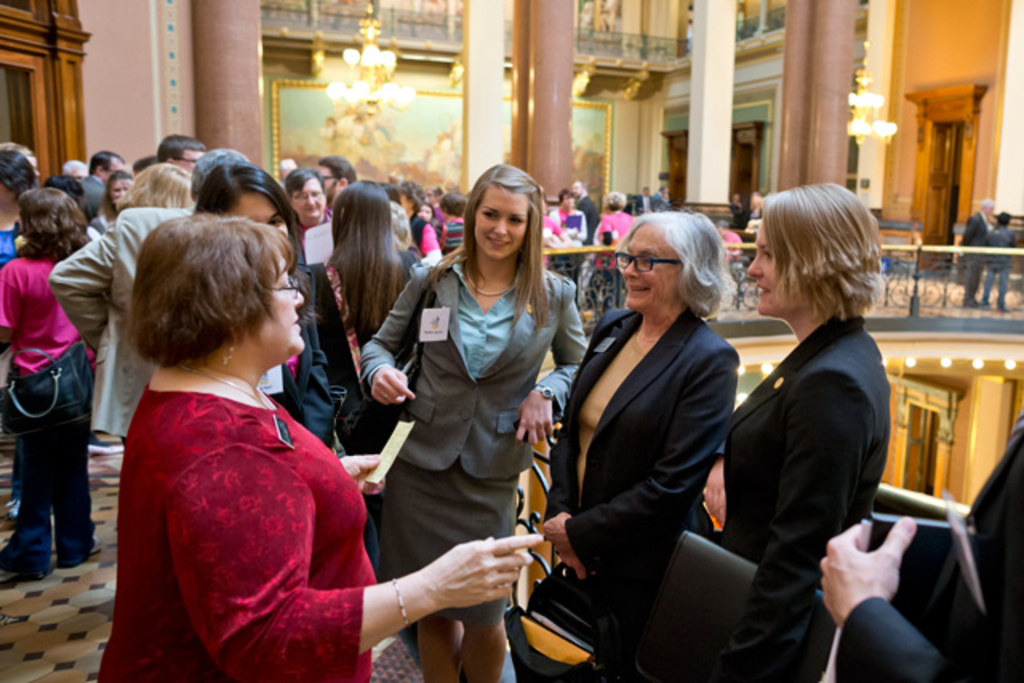Brenna Findley let a group of University of Iowa law students in on the secret to a successful legislative session on Tuesday: sugar and caffeine.
“Two things that are very important in the life of the legislature and lobbyists,” says Findley, who is one of several dozen Iowa governmental, political, and judicial leaders meeting with the 12 students from the UI College of Law who are spending their spring break in Des Moines this week. Findley, legal counsel to Gov. Terry Branstad, co-organized the week’s itinerary with Linda McGuire, associate dean for community engagement in the law school.
The sustained visit is a way to lessen the 90-mile distance between the old and new capitols for law students who want to learn more about career opportunities in public service and government, or about Des Moines in general, McGuire says. The week-long experience is an immersion in the legislative process and gives students exposure to the broad scope of legal employment in Des Moines, and provides them with an opportunity to network and to explore career and professional identities.
The whirlwind week started with a tour of the state capitol on Monday with Findley, who showed them all the venerable building’s nooks and the crannies so they had a literal behind-the-scenes view of the legislative process. They were introduced on the House floor during Monday’s floor session, and Republican Rep. Chris Hagenow, a 1997 graduate of the UI College of Law and House majority whip, worked them into an argument later in the day urging support of a bill.
“They’ve been really well received by so many people up here,” says Findley. “I’ve had several comments from people who said they look like a good team of lawyers.”
The students are also shadowing legislators, learning how they go about their day and the mechanics of the law-making process, meeting with lobbyists, sitting in committee meetings, and in some cases, even helping out with research on bills. They started on Tuesday, listening in during floor debate for bills on topics like mobile home regulations, changes in vehicle registration fees, and offering driver’s education through distance education.
“This is so invigorating,” says Nick de la Cruz, a first year student from Davenport. He was matched up with Tyler Olson, a 2003 College of Law graduate and Democrat from Cedar Rapids. De la Cruz was doubly excited because Olson is chairman of the Iowa Democratic Party, too, and was going to let him sit in on a party leadership meeting during the week.
“My goal is to run for office someday, statewide office, so I just love this,” he says from amidst a swirl of political activity in the rotunda, just outside the House chambers.
First year student Heather Jackson was also soaking it up, although she hopes for a career as a prosecutor. Still, she says it’s important to understand the process because prosecutors need to follow the laws and policies that result from it.
Iowa’s newest legislator is Charles Schneider, a 2002 UI law graduate who was elected in a special election in January, and he was escorting his shadow, Josh Haugo, a first year student from Ankeny.
“This is a great program and will help in so many ways, so I was happy to reach out and show the students the process,” Schneider says.
Kraig Paulsen, a 2003 College of Law graduate and GOP Speaker of the House of Representatives, told the students that in Iowa, the legislature is more moderate and sensible than some legislative bodies. The legislature’s goal, he says, is to get stuff done for Iowans and not political grandstanding.
“Iowans can move the Iowa legislature,” he told the students gathered in his capitol office. “If there’s a group that hooks into an issue, they will change what we’re doing. If you have data and have an anecdote, our legislature will listen to you.”
The students are also meeting with leaders of both parties in both chambers, with state and federal district judges, attorneys in the Attorney General’s office and the state public defender, and corporate counsel at DuPont/Pioneer’s corporate headquarters in Johnston. They will also spend time performing community service legal work with Iowa Legal Aid.

Much of Findley’s presentation was a look at the legislative process that went into more detail than the old Schoolhouse Rock episode. For instance, she reviewed the many ways a bill can die—just a few: missing a funnel deadline to get into or out of committee; majority leader refuses to bring it to the floor; an amendment gets attached that’s so politically poisonous it kills the whole thing. She says death is the fate that awaits most bills—of the thousands introduced during the 2012 session, only 149 were passed by the legislature and signed into law.
She says pages and doorkeepers are great sources of information; LSA means Legislative Services Agency, and they draft bills and amendments, run fiscal impact analyses, and handle HR, IT and other “back office” functions for the legislature; most governors send only a few bills to the legislature during the session, usually concerning the budget and the governor’s two or three key issues (in Branstad’s case, she says that’s commercial property tax reform, education reform, and Healthy Iowans). The vast majority of bills are introduced by the legislators themselves.
“There can be a lot of drama that goes on, but on major issues, things do get worked out in the end,” she says. “We know we need to get things done.”
And when you’re getting worn down, there’s always caffeine and sugar.